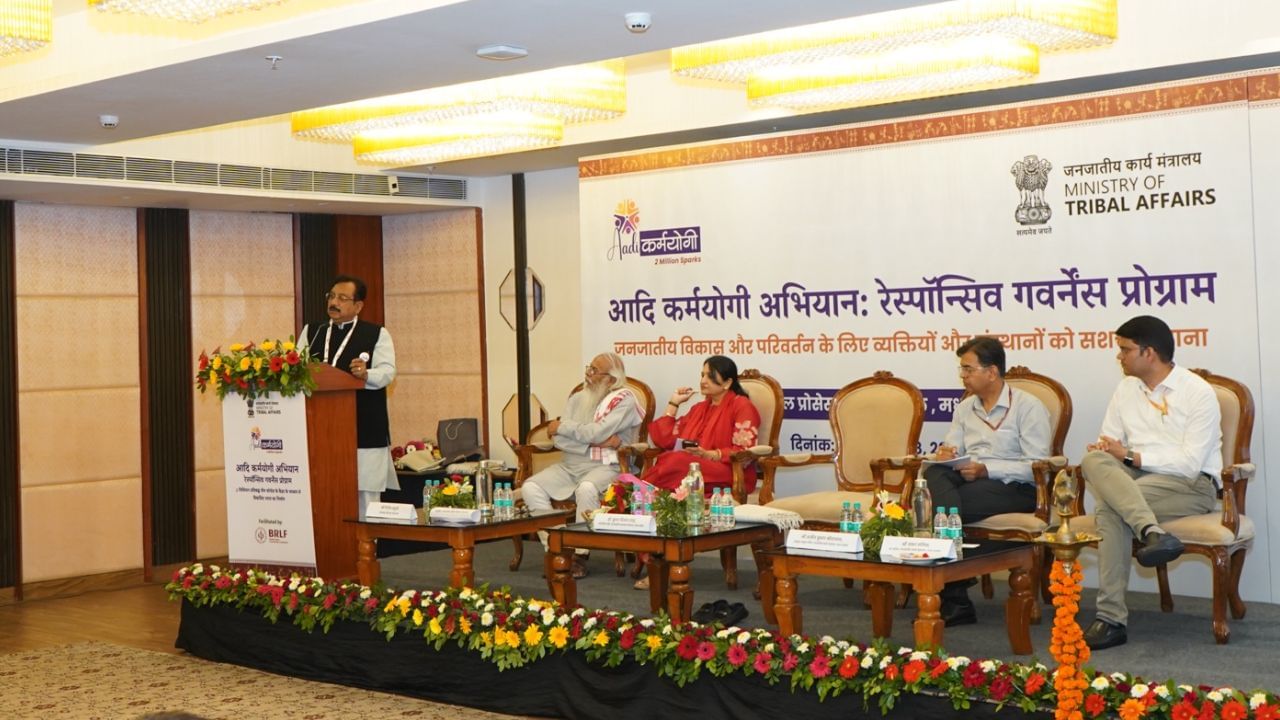Bhopal, Madhya Pradesh, 22nd July 2025: In a landmark step towards achieving Viksit Bharat by 2047, the Ministry of Tribal Affairs, under the visionary leadership of Hon’ble Prime Minister Shri Narendra Modi, launched the 7-day long 2nd Regional Process Lab (RPL) of the Aadi Karmayogi – National Mission for Responsive Governance in Bhopal. This pioneering initiative aims to build a dynamic cadre of 2 million grassroots functionaries and village-level change leaders who will drive inclusive development and strengthen last-mile service delivery in tribal areas.
The RPL, inaugurated at Hotel Regenta Place, Bhopal, marks the continuation of this ambitious national mission. It serves as a strategic capacity-building hub, training State Master Trainers (SMTs) from Madhya Pradesh, Chhattisgarh, and Uttar Pradesh.
Reimagining Governance at the Grassroots
Aadi Karmayogi is more than a programme; it is a call to action to reimagine governance from the bottom up, rooted in India’s tribal ethos and led by local champions. Aligned with flagship initiatives such as PM-JANMAN and DAJGUA, the mission heralds the next chapter in governance innovation, built on the pillars of convergence, community, and capability. It represents governance with both soul and structure, where the aspirations of tribal youth meet responsive institutions, and where policy reaches people with dignity, timeliness, and purpose.
Shri Girish Prabhune, President of Bharat Rural Livelihoods Foundation (BRLF), extended a warm welcome to participants and lauded the Abhiyan as a “timely and transformative intervention” in the tribal development landscape. He emphasized that the initiative arrives at a crucial juncture, offering a strategic push toward inclusive growth. Shri Prabhune highlighted the need to recognize and harness culturally grounded and locally prevalent skills in tribal-dominant villages—essential for sustainable livelihoods and community empowerment. He stressed that development efforts must be context-sensitive, skill-oriented, and community-led to truly resonate with tribal populations and ensure long-term impact.
Dr. Kunwar Vijay Shah, Hon’ble Minister of Tribal Welfare Department, Madhya Pradesh, underscored the importance of convergence among various schemes and the value of nurturing culturally grounded and locally prevalent skills in tribal-dominant villages. He affirmed that the state will extend full institutional support through training infrastructure such as the Tribal Welfare Department Madhya Pradesh, Extension Training Centers, and Panchayat-level facilities to empower SMTs and DMTs. This mission introduces a cadre-based capacity-building model aimed at empowering tribal functionaries and enhancing governance at the community level. By fostering convergence, strengthening institutional capabilities, and promoting community engagement, Aadi Karmayogi is expected to accelerate the impact of tribal development programs and ensure more inclusive and responsive service delivery.
Shri Vibhu Nayar, Secretary, Ministry of Tribal Affairs, joined the process lab virtually and described the Abhiyan as a “historic opportunity” to create a new paradigm of responsive tribal governance. He emphasized the need for localized context-specific solutions supported by inter-departmental convergence. Urging SMTs to become “pioneers of change,” he envisioned them as catalysts for empowering tribal communities and bridging the last-mile governance gap.
Shri L. Vekateshwarlu, Additional Chief Secretary, Tribal Welfare Department, Uttar Pradesh, highlighted the strong role of officials and grassroots workers in implementing flagship schemes like PM-JANMAN and DAJGUA. While acknowledging significant progress, he noted that the Aadi Karmayogi mission would help close the critical last-mile delivery gap through a robust, cadre-based capacity-building model.
Shri Sonmani Borah, Principal Secretary of the Tribal Welfare Department, Chhattisgarh, underscored the vital role played by officials and grassroots workers in successfully implementing flagship tribal welfare schemes such as PM-JANMAN and DAJGUA. While acknowledging the substantial progress made under these initiatives, he emphasized that the newly launched Aadi Karmayogi Mission will be instrumental in bridging the critical last-mile delivery gap.
Shri Gulshan Bamra, Principal Secretary, Tribal Welfare Department, Madhya Pradesh, emphasized the central role of committed officials and grassroots workers in translating tribal welfare schemes like PM-JANMAN and DAJGUA into meaningful outcomes on the ground. He noted that their deep engagement with tribal communities and consistent field-level efforts have been key to the success of these programs. Shri Bamra further highlighted the Aadi Karmayogi Mission as a landmark convergence initiative designed to unify and strengthen tribal development efforts across departments. By adopting a cadre-based capacity-building approach, the mission empowers frontline workers, enhances institutional delivery, and ensures that tribal populations benefit from coordinated, culturally sensitive, and impactful governance—effectively bridging the last-mile gap.
Shri Ajeet Srivastava, Joint Secretary, Ministry of Tribal Affairs and Commissioner, NESTS called Madhya Pradesh a place of huge importance for tribal development activities and described the launching of the second Regional Process Lab of Aadi Karmayogi from Bhopal as a convergence-driven innovative governance model aligned with the Prime Minister’s Mission Karmayogi vision. He emphasized the dual role of SMTs as learners and leaders and celebrated the cultural richness of India’s tribal communities as an essential element of governance excellence.
Shri Jafar Malik, Deputy Secretary, Ministry of Tribal Affairs, in his vote of thanks to all participants, referred to the RPL as a “melting pot of grassroots wisdom” poised to drive systemic transformation. Tracing the evolution of tribal missions—from PM-JANMAN (Wholeof Government) to DAJGUA (Whole of Society), and now Aadi Karmayogi (Whole of Nation)—he called for integration across departments to dismantle silos and deliver coordinated outcomes.
Aadi Karmayogi: A Mission for Every Stakeholder
The Aadi Karmayogi Mission promotes responsive governance through bottom-up visioning, real-time grievance redressal, and collaborative implementation. It is built on convergence across key ministries and departments, including Tribal Affairs, Rural Development, Women & Child Development, Jal Shakti, School Education, and Forests.
The Regional Process Lab (RPL) is a capacity-building hub following a cascading model. SMTs trained here will lead State Process Labs (SPLs), which will, in turn, train District Master Trainers (DMTs). The programme also integrates civil society organizations (CSOs) to strengthen participatory learning and ensure local contextualization.
Seven Regional Process Labs are planned under the Aadi Karmayogi Abhiyan between July to August 2025.
